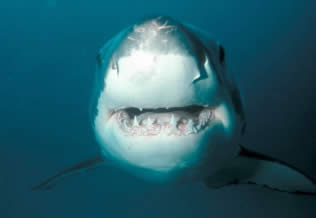Against the backdrop of increased scrutiny and growingly heated discussions on shark finning , the Marine Stewardship Council (MSC) Board of Trustees have recently resolved that fisheries engaged in shark finning would not be eligible for certification to the MSC standard for sustainable fisheries. Not coincidentally, this determination has come in the wake of the 2011 certification of the BC spiny dogfish fishery (a shark species). While the WWF Coral Triangle Programme congratulates the BC dogfish industry for this important achievement (one which illustrates that the sustainable management of shark fishing can in fact be achieved) the clarification around shark finning was welcome news as it prevents a potentially dangerous scenario – where fisheries engaged in finning could somehow get certified – from becoming reality.
“Finning” means the deliberate removal and retention of shark fins while discarding the rest of the shark carcass into the ocean (where they then die). Through the many national and program offices as well as the Coral Triangle Programme, WWF is working hard in addressing the many challenging issues with sharks—from implementation of fishing best practices and at-sea research trials to stronger regulatory and enforcement measures and campaigns aimed at reducing the demand for products such as shark fin soup.
On shark finning, we will be scaling up efforts to eliminate this hideously unsustainable, wasteful and senseless form of fishing. In terms of the MSC statement, the devil is in the details. In its comments to MSC on their resolution, WWF stressed that the full retention of the carcass (i.e. no finning) would not be the only benchmark that a MSC candidate fishery would have to meet. The no-finning policy must also apply to shark bycatch, where a non-shark target species was under consideration for certification. This is a particularly relevant consideration for longline tuna fisheries in the Coral Triangle.
The MSC statement also serves to illustrate the differences in shark fisheries management globally, as well as the variable market drivers at work. The BC spiny dogfish fishery in western Canada sufficiently met criteria under the three MSC principles around stock status, ecosystem impacts and fisheries management systems. It achieved this through several challenging years of fleet rationalization, a move towards individual quota systems, and a re-arrangement of all groundfish management in BC under an integrated management plan. The fishery can demonstrate a sustainable, harvestable surplus of dogfish, based on sound stock assessment and with strong measures in place to avoid over-fishing of both target and bycatch species. The fishery takes the meat as the primary product (the more desired part in their case) and the fins are processed as a by-product (they rate lower in quality than those from certain other species such as hammerhead sharks). This example also highlights the fact that retaining the whole shark also reduces wastage and facilitates better fisheries data collection.
By contrast, in the Coral Triangle and other regions in the developing world, there is virtually zero management of sharks whatsoever. Stock assessment is practically non-existent. No harvest limits are in place. There are precious few regulatory measures in fisheries aimed at sustaining shark populations, either directly or as a “bycatch” species in other fisheries. And despite the fact some countries have anti-finning policies in place, finning remains prominent (and enforcement highly insufficient).
Attention in the Coral Triangle region, with respect to the MSC statement, is turning towards longline tuna fisheries. Indeed, longline tuna fisheries generally consider shark as an economically important species, certainly not a “bycatch” species in a commercial sense. The WWF Coral Triangle Programme is increasing its efforts with the tuna industry to implement best practices in their longline operations, including foremost verifiably eliminating the shark finning practice, as well as efforts to improve data collection, assess impacts and to utilize operational measures that substantially reduce the mortality of shark species of special concern (i.e. red listed species).
Such efforts will improve a tuna fishery’s performance against MSC indicators; however, bycatch best practices and elimination of finning will not be enough. For both directed and non-directed fisheries on sharks, MSC certification will require significant, broad and lasting improvements in the fishery, including the use of precautionary harvest limits and the application of risk-adverse, ecosystem-based management. New policies and effective, well-enforced regulatory measures are equally urgently required.
Wherever a particular fishery – shark, tuna or otherwise – may be in the sustainable management spectrum, the Coral Triangle Programme remains committed to working with fishing companies and fishing communities to help these fisheries improve and get on track to MSC. The fact that the bar for MSC certification for fisheries that capture sharks has been kept high is welcome news indeed, and while the road ahead for shark fishing is a challenging one, we remain hopeful that the goal of sustainable, well-managed fisheries is a feasible one for shark and shark-associated fishing in the region.















